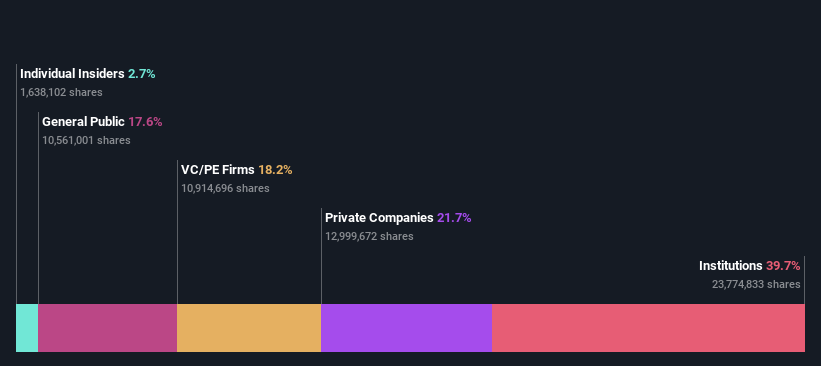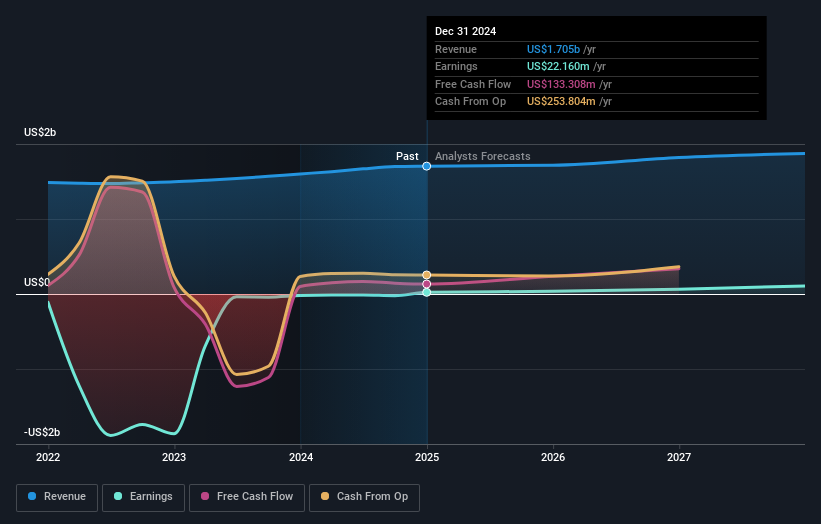- United States
- /
- Diversified Financial
- /
- NYSE:PSFE
The recent drop in prices must have disappointed Paysafe Limited (NYSE:PSFE) institutional investors who own 40% of the shares

Key Insights
- Given the large stake in the stock by institutions, Paysafe's stock price might be vulnerable to their trading decisions
- The top 4 shareholders own 50% of the company
- Ownership research along with analyst forecasts data help provide a good understanding of opportunities in a stock
A look at the shareholders of Paysafe Limited (NYSE:PSFE) can tell us which group is most powerful. The group holding the most number of shares in the company, around 40% to be precise, is institutions. In other words, the group stands to gain the most (or lose the most) from their investment into the company.
Unfortunately, institutional ended up on the other end of the spectrum as market cap fell by US$134m.
Let's take a closer look to see what the different types of shareholders can tell us about Paysafe.
Check out our latest analysis for Paysafe

What Does The Institutional Ownership Tell Us About Paysafe?
Institutional investors commonly compare their own returns to the returns of a commonly followed index. So they generally do consider buying larger companies that are included in the relevant benchmark index.
We can see that Paysafe does have institutional investors; and they hold a good portion of the company's stock. This can indicate that the company has a certain degree of credibility in the investment community. However, it is best to be wary of relying on the supposed validation that comes with institutional investors. They too, get it wrong sometimes. If multiple institutions change their view on a stock at the same time, you could see the share price drop fast. It's therefore worth looking at Paysafe's earnings history below. Of course, the future is what really matters.

Hedge funds don't have many shares in Paysafe. The company's largest shareholder is PI Holdings Jersey Limited, with ownership of 22%. Blackstone Inc. is the second largest shareholder owning 18% of common stock, and Fidelity National Financial Inc., Asset Management Arm holds about 6.3% of the company stock.
Our research also brought to light the fact that roughly 50% of the company is controlled by the top 4 shareholders suggesting that these owners wield significant influence on the business.
While studying institutional ownership for a company can add value to your research, it is also a good practice to research analyst recommendations to get a deeper understand of a stock's expected performance. There are plenty of analysts covering the stock, so it might be worth seeing what they are forecasting, too.
Insider Ownership Of Paysafe
The definition of an insider can differ slightly between different countries, but members of the board of directors always count. The company management answer to the board and the latter should represent the interests of shareholders. Notably, sometimes top-level managers are on the board themselves.
Insider ownership is positive when it signals leadership are thinking like the true owners of the company. However, high insider ownership can also give immense power to a small group within the company. This can be negative in some circumstances.
Shareholders would probably be interested to learn that insiders own shares in Paysafe Limited. It has a market capitalization of just US$964m, and insiders have US$26m worth of shares, in their own names. It is good to see some investment by insiders, but it might be worth checking if those insiders have been buying.
General Public Ownership
With a 18% ownership, the general public, mostly comprising of individual investors, have some degree of sway over Paysafe. While this size of ownership may not be enough to sway a policy decision in their favour, they can still make a collective impact on company policies.
Private Equity Ownership
With an ownership of 18%, private equity firms are in a position to play a role in shaping corporate strategy with a focus on value creation. Sometimes we see private equity stick around for the long term, but generally speaking they have a shorter investment horizon and -- as the name suggests -- don't invest in public companies much. After some time they may look to sell and redeploy capital elsewhere.
Private Company Ownership
It seems that Private Companies own 22%, of the Paysafe stock. Private companies may be related parties. Sometimes insiders have an interest in a public company through a holding in a private company, rather than in their own capacity as an individual. While it's hard to draw any broad stroke conclusions, it is worth noting as an area for further research.
Next Steps:
While it is well worth considering the different groups that own a company, there are other factors that are even more important. Be aware that Paysafe is showing 2 warning signs in our investment analysis , and 1 of those is significant...
But ultimately it is the future, not the past, that will determine how well the owners of this business will do. Therefore we think it advisable to take a look at this free report showing whether analysts are predicting a brighter future.
NB: Figures in this article are calculated using data from the last twelve months, which refer to the 12-month period ending on the last date of the month the financial statement is dated. This may not be consistent with full year annual report figures.
New: Manage All Your Stock Portfolios in One Place
We've created the ultimate portfolio companion for stock investors, and it's free.
• Connect an unlimited number of Portfolios and see your total in one currency
• Be alerted to new Warning Signs or Risks via email or mobile
• Track the Fair Value of your stocks
Have feedback on this article? Concerned about the content? Get in touch with us directly. Alternatively, email editorial-team (at) simplywallst.com.
This article by Simply Wall St is general in nature. We provide commentary based on historical data and analyst forecasts only using an unbiased methodology and our articles are not intended to be financial advice. It does not constitute a recommendation to buy or sell any stock, and does not take account of your objectives, or your financial situation. We aim to bring you long-term focused analysis driven by fundamental data. Note that our analysis may not factor in the latest price-sensitive company announcements or qualitative material. Simply Wall St has no position in any stocks mentioned.
About NYSE:PSFE
Paysafe
Provides end-to-end payment solutions in the United States, Germany, the United Kingdom, and internationally.
Fair value with moderate growth potential.
Similar Companies
Market Insights
Community Narratives





